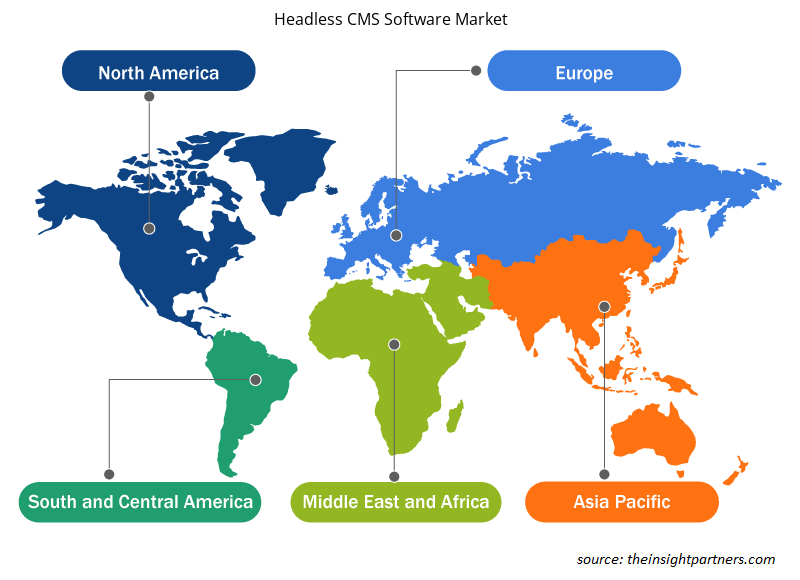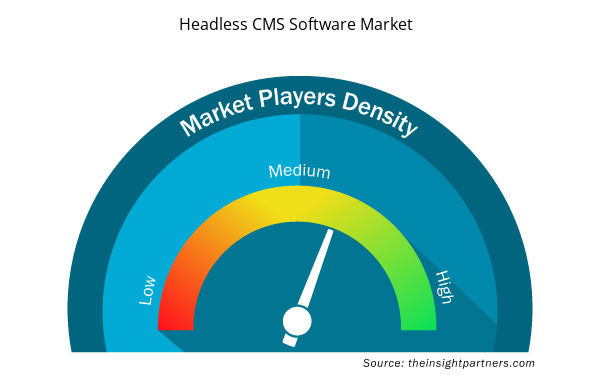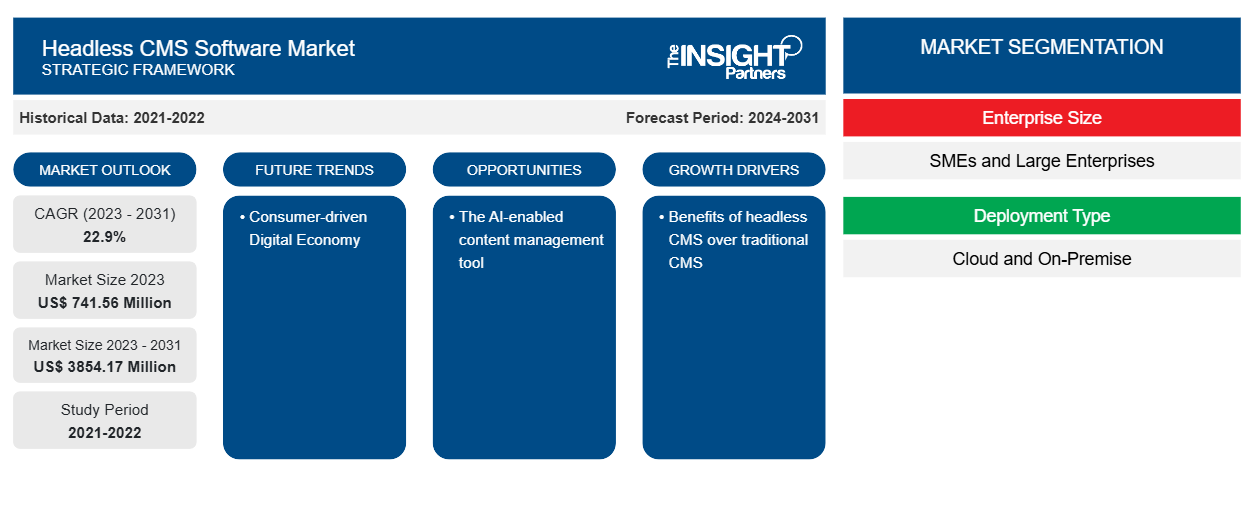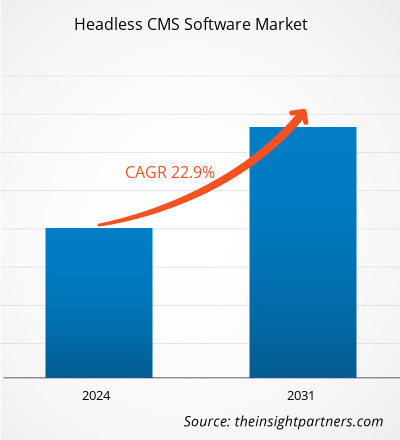من المتوقع أن يصل حجم سوق برامج إدارة المحتوى بدون واجهة إلى 3854.17 مليون دولار أمريكي بحلول عام 2031 من 741.56 مليون دولار أمريكي في عام 2023. ومن المتوقع أن يسجل السوق معدل نمو سنوي مركب بنسبة 22.9٪ في الفترة 2023-2031. ومن المرجح أن يظل النمو السريع للمحتوى الرقمي وتبني التقنيات المستندة إلى السحابة مفتاحًا لاتجاهات سوق برامج إدارة المحتوى بدون واجهة.
تحليل سوق برامج إدارة المحتوى بدون رأس
يؤدي تبني برامج إدارة المحتوى بدون واجهة مستخدم إلى تحسين الأمان والأداء، وقد تعزز برامج إدارة المحتوى بدون واجهة مستخدم المرونة وقابلية التوسع والتوطين. هذا العامل هو الذي يحرك سوق برامج إدارة المحتوى بدون واجهة مستخدم. إن الطلب على برامج إدارة المحتوى بدون واجهة مستخدم عبر مختلف الصناعات في البلدان المتقدمة والنامية يدفع نمو سوقها.
نظرة عامة على سوق برامج إدارة المحتوى بدون رأس
يُعد نظام إدارة المحتوى بدون واجهة مستخدم نظام إدارة محتوى يسمح لك بفصل الواجهة الأمامية عن الواجهة الخلفية. يعمل نظام إدارة المحتوى كمستودع للمحتوى في هذه البنية، ويمكن نشر المحتوى على منصات متعددة عبر واجهة برمجة التطبيقات. تتمثل إحدى الفوائد الأساسية لنظام إدارة المحتوى بدون واجهة مستخدم في مرونته. في نظام إدارة المحتوى التقليدي، تكون الواجهة الأمامية والخلفية مرتبطتين بشكل لا ينفصم، لذا فإن التغييرات التي تطرأ على الواجهة الأمامية تؤثر على التغييرات التي تطرأ على الواجهة الخلفية، والعكس صحيح. في نظام إدارة المحتوى بدون واجهة مستخدم، يتم فصل الواجهة الخلفية عن الواجهة الأمامية، مما يسمح للشركات بتغيير محتواها وتطبيقاتها على الواجهة الأمامية دون التأثير على الواجهة الخلفية.
قم بتخصيص هذا التقرير ليناسب متطلباتك
ستحصل على تخصيص لأي تقرير - مجانًا - بما في ذلك أجزاء من هذا التقرير، أو تحليل على مستوى الدولة، وحزمة بيانات Excel، بالإضافة إلى الاستفادة من العروض والخصومات الرائعة للشركات الناشئة والجامعات
- احصل على أهم اتجاهات السوق الرئيسية لهذا التقرير.ستتضمن هذه العينة المجانية تحليلاً للبيانات، بدءًا من اتجاهات السوق وحتى التقديرات والتوقعات.
محركات وفرص سوق برامج إدارة المحتوى بدون رأس
الاقتصاد الرقمي الذي يقوده المستهلك لصالح السوق
لقد أصبح الاقتصاد الرقمي الذي يقوده المستهلك هو المكون الأساسي لاستراتيجيات التجارة الرقمية عبر الصناعات. يصل المستهلك إلى الشركات أو العلامات التجارية عبر عدد من القنوات. وهذا يشجع الشركات على تحديث استراتيجية تجربتها الرقمية لتقديم تجارب متعددة القنوات حقيقية لتلبية متطلبات التخصيص للعملاء. يجب أن يكون المحتوى الذي يركز على العملاء مخصصًا وديناميكيًا ويتم تقديمه بسرعة كبيرة. مع فوائد المرونة والقدرة على التوسع والتخصيص، يمكن لبرامج إدارة المحتوى بدون واجهة مساعدة الشركات على تحسين تجربة العملاء.
فوائد نظام إدارة المحتوى بدون رأس مقارنة بنظام إدارة المحتوى التقليدي
يوفر نظام إدارة المحتوى بدون واجهة مستخدم مرونة أكبر مقارنة بأنظمة إدارة المحتوى التقليدية، حيث يجب إنشاء المحتوى مرة واحدة مع نظام إدارة المحتوى بدون واجهة مستخدم. ويمكن توزيعه على قنوات وأجهزة متعددة، بما في ذلك مواقع الويب والساعات الذكية وتطبيقات الأجهزة المحمولة وأجهزة إنترنت الأشياء وغيرها. يوفر نظام إدارة المحتوى بدون واجهة مستخدم المحتوى عبر واجهات برمجة التطبيقات حيث يتم تحميل الصفحات بسرعة أكبر وكفاءة أكبر، بينما مع نظام إدارة المحتوى التقليدي، تتطلب كل صفحة تشغيل عرض تقديمي من جانب الخادم، مما يتسبب في بطء وقت التحميل. يعد نظام إدارة المحتوى بدون واجهة مستخدم أكثر أمانًا من نظام إدارة المحتوى التقليدي لأنه يستخدم تقنيات سحابية متقدمة ولا يعرض الخادم الخلفي للإنترنت. وبالتالي، فإن هذه الفوائد العديدة لنظام إدارة المحتوى بدون واجهة مستخدم مقارنة بنظام إدارة المحتوى التقليدي تؤدي إلى نمو سوق برامج نظام إدارة المحتوى بدون واجهة مستخدم.CMS offers greater flexibility over traditional CMS, as with the headless CMS, the content needs to be created once. It can be distributed to multiple channels and devices, including websites, smartwatches, mobile apps, devicesCMS delivers content via APIs where the pages load at a greater speed more efficiently, whereas with the traditional CMS, each page requires trigger a server-side-render, which causes slow load time. Headless CMS is more secure than traditional CMS as they use advanced cloud-native technologies and they don’t expose the backend server to the internet. Thus, such several benefits of headless CMS over traditional CMS lead to the headless CMS software market growth.
تقرير تحليل تجزئة سوق برامج إدارة المحتوى بدون رأس
كانت القطاعات الرئيسية التي ساهمت في اشتقاق تحليل سوق برامج إدارة المحتوى بدون رأس هي نشر الحبر، وحجم المنظمة، ونوع المراقبة، والصناعة.
- من خلال النشر، يتم تقسيم السوق إلى محلي وسحابي. ومن المتوقع أن ينمو قطاع السحابة بأعلى معدل نمو سنوي مركب.
- بناءً على حجم المؤسسة، يتم تقسيم السوق إلى الشركات الصغيرة والمتوسطة الحجم والشركات الكبيرة. ومن المتوقع أن ينمو قطاع الشركات الصغيرة والمتوسطة الحجم بأعلى معدل نمو سنوي مركب.
تحليل حصة سوق برامج إدارة المحتوى بدون رأس حسب المنطقة الجغرافية
ينقسم النطاق الجغرافي لتقرير سوق برامج CMS بدون رأس بشكل أساسي إلى خمس مناطق: أمريكا الشمالية، ومنطقة آسيا والمحيط الهادئ، وأوروبا، والشرق الأوسط وأفريقيا، وأمريكا الجنوبية/أمريكا الجنوبية والوسطى.
من المتوقع أن تنمو منطقة آسيا والمحيط الهادئ بأعلى معدل نمو سنوي مركب. يؤدي انتشار تكنولوجيا الحوسبة السحابية في المنطقة إلى نمو سوق المنطقة. تعمل الشركات الصغيرة والمتوسطة الحجم المتنامية في المنطقة على تغذية الطلب على حلول البرامج في المنطقة، مما يدفع إلى استخدام تكنولوجيا المراقبة الاصطناعية . يؤدي التحول الرقمي في الاقتصادات الناشئة مثل الهند والصين إلى اعتماد حلول المراقبة الاصطناعية في مختلف صناعات المستخدم النهائي.
رؤى إقليمية حول سوق برامج إدارة المحتوى بدون رأس
لقد قام المحللون في Insight Partners بشرح الاتجاهات والعوامل الإقليمية المؤثرة على سوق برمجيات إدارة المحتوى بدون رأس طوال فترة التوقعات بشكل شامل. يناقش هذا القسم أيضًا قطاعات سوق برمجيات إدارة المحتوى بدون رأس والجغرافيا في جميع أنحاء أمريكا الشمالية وأوروبا ومنطقة آسيا والمحيط الهادئ والشرق الأوسط وأفريقيا وأمريكا الجنوبية والوسطى.

- احصل على البيانات الإقليمية المحددة لسوق برامج إدارة المحتوى بدون رأس
نطاق تقرير سوق برامج إدارة المحتوى بدون رأس
| سمة التقرير | تفاصيل |
|---|---|
| حجم السوق في عام 2023 | 741.56 مليون دولار أمريكي |
| حجم السوق بحلول عام 2031 | 3854.17 مليون دولار أمريكي |
| معدل النمو السنوي المركب العالمي (2023 - 2031) | 22.9% |
| البيانات التاريخية | 2021-2022 |
| فترة التنبؤ | 2024-2031 |
| القطاعات المغطاة | حسب حجم المؤسسة
|
| المناطق والدول المغطاة | أمريكا الشمالية
|
| قادة السوق وملفات تعريف الشركات الرئيسية |
|
كثافة اللاعبين في سوق برامج إدارة المحتوى بدون رأس: فهم تأثيرها على ديناميكيات الأعمال
يشهد سوق برامج إدارة المحتوى بدون رأس نموًا سريعًا، مدفوعًا بالطلب المتزايد من المستخدم النهائي بسبب عوامل مثل تفضيلات المستهلك المتطورة والتقدم التكنولوجي والوعي المتزايد بفوائد المنتج. ومع ارتفاع الطلب، تعمل الشركات على توسيع عروضها والابتكار لتلبية احتياجات المستهلكين والاستفادة من الاتجاهات الناشئة، مما يؤدي إلى زيادة نمو السوق.
تشير كثافة اللاعبين في السوق إلى توزيع الشركات أو المؤسسات العاملة في سوق أو صناعة معينة. وهي تشير إلى عدد المنافسين (اللاعبين في السوق) الموجودين في مساحة سوق معينة نسبة إلى حجمها أو قيمتها السوقية الإجمالية.
الشركات الرئيسية العاملة في سوق برمجيات CMS بدون رأس هي:
- شركة أجيليتي
- زبدةCMS
- شركة كونتينتفول المحدودة
- شركة كونتنتستاك
- دوت سي ام اس ذ.م.م
- شركة هايغراف المحدودة
إخلاء المسؤولية : الشركات المذكورة أعلاه ليست مرتبة بأي ترتيب معين.

- احصل على نظرة عامة على أهم اللاعبين الرئيسيين في سوق برمجيات إدارة المحتوى بدون رأس
أخبار سوق برامج إدارة المحتوى بدون رأس والتطورات الأخيرة
يتم تقييم سوق برامج إدارة المحتوى بدون رأس من خلال جمع البيانات النوعية والكمية بعد البحث الأولي والثانوي، والذي يتضمن منشورات الشركات المهمة وبيانات الجمعيات وقواعد البيانات. فيما يلي قائمة بالتطورات في السوق:
- في يونيو 2023، تهدف aurastride، أحدث إضافة إلى مجموعة منتجات Vsourz، إلى إحداث تغيير جذري في صناعة السفر بإطلاقها كمنصة CMS بدون واجهة مستخدم متطورة. من المقرر أن يعمل هذا الحل المبتكر على تحويل الطريقة التي تدير بها شركات السفر المحتوى وتقدم تجارب مخصصة، مع تقديم تكامل سلس مع منصة Moonstride SAAS لصناعة السفر التي تحظى بتقدير كبير. (المصدر: Moonstride، بيان صحفي، 2023)
تقرير سوق برامج إدارة المحتوى بدون رأس يغطي المنتجات المطلوبة
يوفر تقرير "حجم سوق برمجيات إدارة المحتوى بدون رأس وتوقعاته (2021-2031)" تحليلاً مفصلاً للسوق يغطي المجالات التالية:
- حجم السوق والتوقعات على المستويات العالمية والإقليمية والوطنية لجميع قطاعات السوق الرئيسية التي يغطيها النطاق
- ديناميكيات السوق مثل المحركات والقيود والفرص الرئيسية
- الاتجاهات المستقبلية الرئيسية
- تحليل مفصل لقوى PEST/Porter الخمس وSWOT
- تحليل السوق العالمي والإقليمي الذي يغطي اتجاهات السوق الرئيسية واللاعبين الرئيسيين واللوائح والتطورات الأخيرة في السوق
- تحليل المشهد الصناعي والمنافسة الذي يغطي تركيز السوق، وتحليل خريطة الحرارة، واللاعبين البارزين، والتطورات الأخيرة
- ملفات تعريف الشركة التفصيلية
- التحليل التاريخي (سنتان)، السنة الأساسية، التوقعات (7 سنوات) مع معدل النمو السنوي المركب
- تحليل PEST و SWOT
- حجم السوق والقيمة / الحجم - عالميًا وإقليميًا وقطريًا
- الصناعة والمنافسة
- مجموعة بيانات Excel


- Excimer & Femtosecond Ophthalmic Lasers Market
- Arterial Blood Gas Kits Market
- Batter and Breader Premixes Market
- Dropshipping Market
- Rare Neurological Disease Treatment Market
- Redistribution Layer Material Market
- Customer Care BPO Market
- Aircraft Landing Gear Market
- Drain Cleaning Equipment Market
- Rugged Servers Market

Report Coverage
Revenue forecast, Company Analysis, Industry landscape, Growth factors, and Trends

Segment Covered
This text is related
to segments covered.

Regional Scope
North America, Europe, Asia Pacific, Middle East & Africa, South & Central America

Country Scope
This text is related
to country scope.
الأسئلة الشائعة
The global headless CMS software market was estimated to be US$ 741.56 million in 2023 and is expected to grow at a CAGR of 22.9% during the forecast period 2023 - 2031.
The rapid growth of digital content and the adoption of cloud-based technologies are the major factors that propel the global headless CMS software market.
The AI-enabled content management tool is anticipated to play a significant role in the global headless CMS software market in the coming years.
The key players holding majority shares in the global headless CMS software market are Agility Inc., ButterCMS, Contentful GmbH, Contentstack Inc., and dotCMS LLC.
The global headless CMS software market is expected to reach US$ 3854.17 million by 2031.
The incremental growth expected to be recorded for the global headless CMS software market during the forecast period is US$ 3112.61 million.
Trends and growth analysis reports related to Technology, Media and Telecommunications : READ MORE..
The Insight Partners performs research in 4 major stages: Data Collection & Secondary Research, Primary Research, Data Analysis and Data Triangulation & Final Review.
- Data Collection and Secondary Research:
As a market research and consulting firm operating from a decade, we have published and advised several client across the globe. First step for any study will start with an assessment of currently available data and insights from existing reports. Further, historical and current market information is collected from Investor Presentations, Annual Reports, SEC Filings, etc., and other information related to company’s performance and market positioning are gathered from Paid Databases (Factiva, Hoovers, and Reuters) and various other publications available in public domain.
Several associations trade associates, technical forums, institutes, societies and organization are accessed to gain technical as well as market related insights through their publications such as research papers, blogs and press releases related to the studies are referred to get cues about the market. Further, white papers, journals, magazines, and other news articles published in last 3 years are scrutinized and analyzed to understand the current market trends.
- Primary Research:
The primarily interview analysis comprise of data obtained from industry participants interview and answers to survey questions gathered by in-house primary team.
For primary research, interviews are conducted with industry experts/CEOs/Marketing Managers/VPs/Subject Matter Experts from both demand and supply side to get a 360-degree view of the market. The primary team conducts several interviews based on the complexity of the markets to understand the various market trends and dynamics which makes research more credible and precise.
A typical research interview fulfils the following functions:
- Provides first-hand information on the market size, market trends, growth trends, competitive landscape, and outlook
- Validates and strengthens in-house secondary research findings
- Develops the analysis team’s expertise and market understanding
Primary research involves email interactions and telephone interviews for each market, category, segment, and sub-segment across geographies. The participants who typically take part in such a process include, but are not limited to:
- Industry participants: VPs, business development managers, market intelligence managers and national sales managers
- Outside experts: Valuation experts, research analysts and key opinion leaders specializing in the electronics and semiconductor industry.
Below is the breakup of our primary respondents by company, designation, and region:

Once we receive the confirmation from primary research sources or primary respondents, we finalize the base year market estimation and forecast the data as per the macroeconomic and microeconomic factors assessed during data collection.
- Data Analysis:
Once data is validated through both secondary as well as primary respondents, we finalize the market estimations by hypothesis formulation and factor analysis at regional and country level.
- Macro-Economic Factor Analysis:
We analyse macroeconomic indicators such the gross domestic product (GDP), increase in the demand for goods and services across industries, technological advancement, regional economic growth, governmental policies, the influence of COVID-19, PEST analysis, and other aspects. This analysis aids in setting benchmarks for various nations/regions and approximating market splits. Additionally, the general trend of the aforementioned components aid in determining the market's development possibilities.
- Country Level Data:
Various factors that are especially aligned to the country are taken into account to determine the market size for a certain area and country, including the presence of vendors, such as headquarters and offices, the country's GDP, demand patterns, and industry growth. To comprehend the market dynamics for the nation, a number of growth variables, inhibitors, application areas, and current market trends are researched. The aforementioned elements aid in determining the country's overall market's growth potential.
- Company Profile:
The “Table of Contents” is formulated by listing and analyzing more than 25 - 30 companies operating in the market ecosystem across geographies. However, we profile only 10 companies as a standard practice in our syndicate reports. These 10 companies comprise leading, emerging, and regional players. Nonetheless, our analysis is not restricted to the 10 listed companies, we also analyze other companies present in the market to develop a holistic view and understand the prevailing trends. The “Company Profiles” section in the report covers key facts, business description, products & services, financial information, SWOT analysis, and key developments. The financial information presented is extracted from the annual reports and official documents of the publicly listed companies. Upon collecting the information for the sections of respective companies, we verify them via various primary sources and then compile the data in respective company profiles. The company level information helps us in deriving the base number as well as in forecasting the market size.
- Developing Base Number:
Aggregation of sales statistics (2020-2022) and macro-economic factor, and other secondary and primary research insights are utilized to arrive at base number and related market shares for 2022. The data gaps are identified in this step and relevant market data is analyzed, collected from paid primary interviews or databases. On finalizing the base year market size, forecasts are developed on the basis of macro-economic, industry and market growth factors and company level analysis.
- Data Triangulation and Final Review:
The market findings and base year market size calculations are validated from supply as well as demand side. Demand side validations are based on macro-economic factor analysis and benchmarks for respective regions and countries. In case of supply side validations, revenues of major companies are estimated (in case not available) based on industry benchmark, approximate number of employees, product portfolio, and primary interviews revenues are gathered. Further revenue from target product/service segment is assessed to avoid overshooting of market statistics. In case of heavy deviations between supply and demand side values, all thes steps are repeated to achieve synchronization.
We follow an iterative model, wherein we share our research findings with Subject Matter Experts (SME’s) and Key Opinion Leaders (KOLs) until consensus view of the market is not formulated – this model negates any drastic deviation in the opinions of experts. Only validated and universally acceptable research findings are quoted in our reports.
We have important check points that we use to validate our research findings – which we call – data triangulation, where we validate the information, we generate from secondary sources with primary interviews and then we re-validate with our internal data bases and Subject matter experts. This comprehensive model enables us to deliver high quality, reliable data in shortest possible time.


 احصل على عينة مجانية لهذا التقرير
احصل على عينة مجانية لهذا التقرير